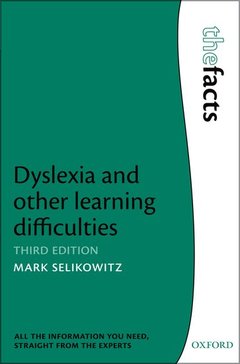Description
Dyslexia and other learning difficulties (3rd Ed.)
The Facts Series
Author: Selikowitz Mark
Language: English
Publication date: 07-2012
146 p. · 12.9x19.6 cm · Paperback
146 p. · 12.9x19.6 cm · Paperback
Description
/li>Contents
/li>Biography
/li>
Dyslexia and other learning difficulties: The Facts addresses problems many intelligent children face who, while having normal IQ levels, still struggle to learn in the classroom setting. A short attention span, restlessness, an inability to write clearly, and reading comprehension well below age level are all indicators of learning disabilities, and this book offers a clear and sympathetic guide to the difficulties that parents and teachers face when working with a child with these sorts of obstacles to learning. The book deals with difficulties in traditional academic areas such as reading, spelling, and arithmetic, but also looks into lesser known conditions like clumsiness, social unease, and hyperactivity. Providing practical advice to parents to help understand their children's difficulties and to help them overcome problems and improve their self-esteem, Dyslexia and other learning difficulties: The Facts also offers a number of suggestions for managing difficult behaviour. This new edition has been fully updated and draws on the most recent research on learning difficulties and some associated disorders and their treatments. It also provides information about electronic and computer aids that are now available to help individuals with learning difficulties. This encouraging approach and easy-to-read style will appeal to parents as well as to professionals who work with children with learning disabilities.
Part 1: Introduction. 1. What are specific learning difficulties?. 2. How a specific learning difficulty is diagnosed. 3. Theories of causation. 4. How parents can help-general principles. Part 2: Areas of learning. 5. Reading. 6. Spelling. 7. Writing. 8. Arithmetic. 9. Language. 10. Attention-deficit/hyperactivity disorder and sequential organization difficulties. 11. Coordination and clumsiness. 12. Social and emotional development. Part 3. 13. Controversial treatments. 14. Adulthood. Conclusion. Appendix: Useful organizations.
Dr Mark Selikowitz is a consultant developmental paediatrician and the co-founder and director of the Sydney Developmental Clinic - one of the world's largest child development units. He has over thirty years' experience in the diagnosis and treatment of childhood developmental problems. He is the author of four books dealing with such problems, and has co-authored numerous research articles published in international journals. He is in great demand as a speaker.
© 2024 LAVOISIER S.A.S.




